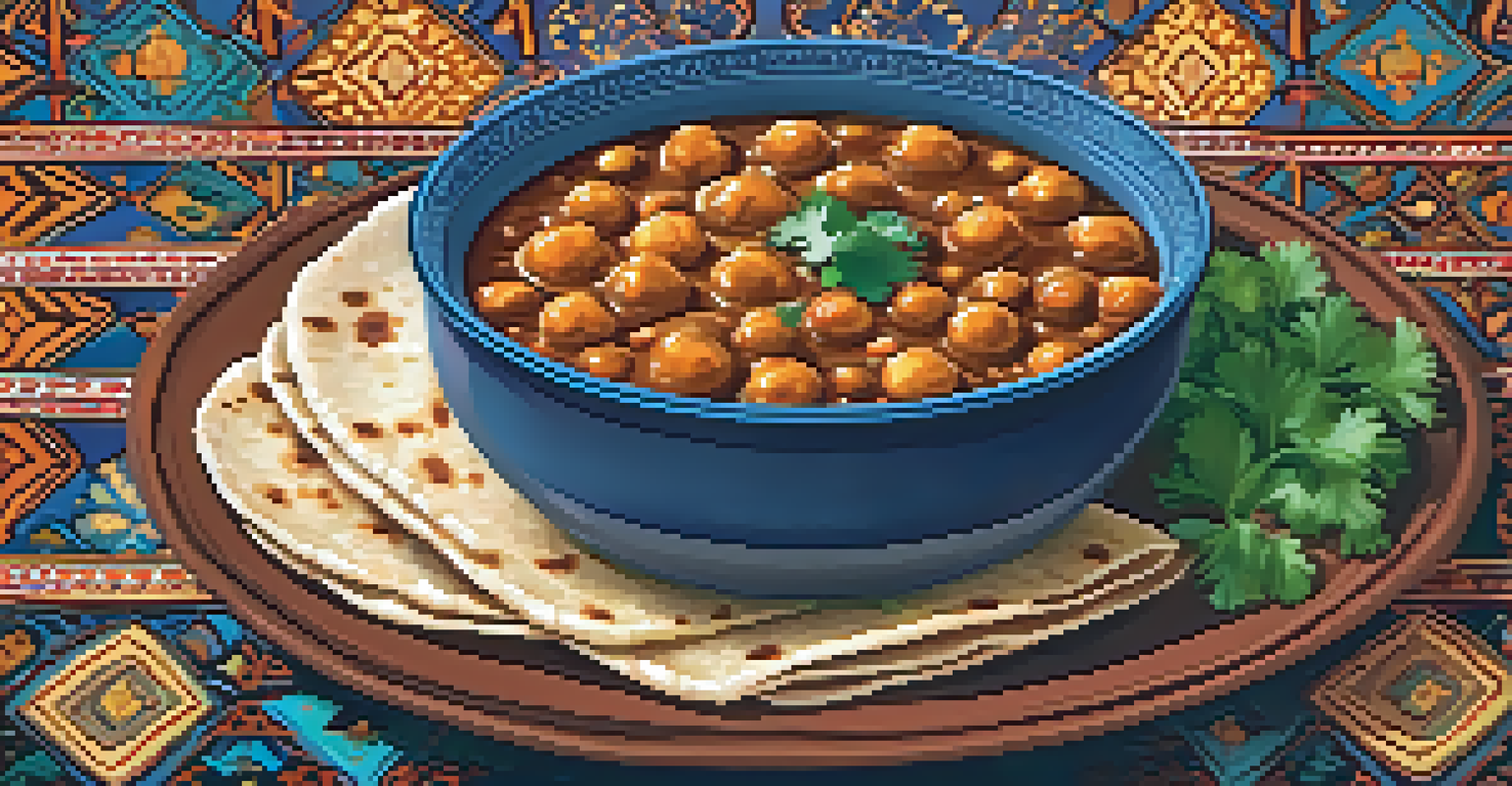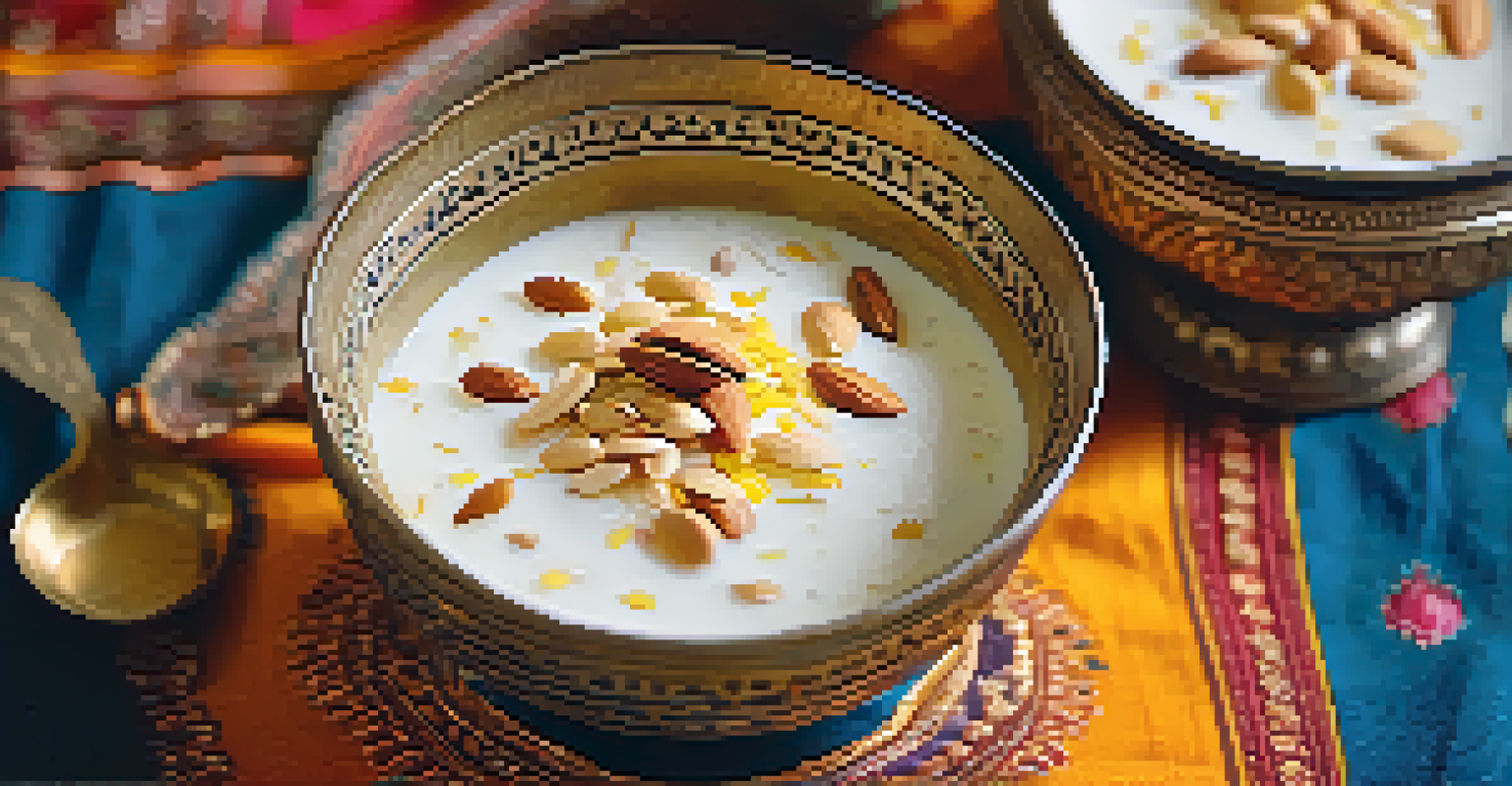Exploring Traditional Indian Cuisine Through Vegan Recipes

The Rich Heritage of Indian Cuisine
Indian cuisine is a tapestry woven from centuries of history, culture, and regional diversity. Each state boasts its own unique flavors and cooking techniques, influenced by local ingredients and traditions. This vibrant culinary landscape is not just about food; it's a celebration of life, family, and community.
Food is not just what we eat; it's an expression of who we are.
Traditionally, Indian cooking emphasizes the use of fresh, seasonal produce, which aligns beautifully with vegan principles. Dishes like dal and sabzi showcase the heart of Indian meals, highlighting how plant-based eating has been integral to the culture for generations. The emphasis on spices not only adds flavor but also brings health benefits, making these dishes both delicious and nutritious.
By exploring vegan recipes, we can appreciate the roots of Indian cuisine while embracing a compassionate lifestyle. It opens the door to creative adaptations that honor traditional flavors while catering to modern dietary preferences.
Key Ingredients in Vegan Indian Cooking
Vegan Indian cuisine utilizes a rich array of ingredients that are both flavorful and nutritious. Staples like lentils, chickpeas, and various grains provide the foundation for many dishes, offering protein and fiber. Fresh vegetables, herbs, and spices round out the meals, creating a symphony of flavors that dance on the palate.

Spices such as turmeric, cumin, and coriander are not just flavor enhancers but also have medicinal properties. For example, turmeric is renowned for its anti-inflammatory benefits, making it a staple in both traditional and modern cooking. This rich use of spices makes vegan dishes exciting and satisfying, ensuring that no meal is ever dull.
Indian Cuisine's Rich Diversity
Indian cuisine is a vibrant mix of regional flavors, influenced by history and local ingredients.
Incorporating these ingredients into vegan recipes allows for a depth of flavor that many might not expect. Whether it’s a fragrant coconut curry or a spicy chickpea salad, the combination of these elements showcases the versatility of plant-based cooking.
Popular Vegan Indian Dishes to Try
When it comes to vegan Indian dishes, there's no shortage of options to explore. One standout is Chana Masala, a hearty chickpea curry packed with spices and served with rice or bread. This dish is not only delicious but also filling, making it a go-to for many vegan and non-vegan diners alike.
The spice of life is variety, and it’s the heart of Indian cuisine.
Another favorite is Aloo Gobi, a delightful mix of potatoes and cauliflower seasoned with turmeric, cumin, and other spices. This dish exemplifies how simple ingredients can create something extraordinary and comforting. It's a perfect side dish or main course that can be enjoyed by everyone at the table.
Don't forget about the plethora of lentil dishes, such as Dal Tadka, which features seasoned yellow lentils cooked to perfection. Each of these dishes reflects the essence of Indian cooking, proving that plant-based meals can be just as rich and satisfying as their non-vegan counterparts.
The Role of Spices in Vegan Indian Cuisine
Spices are the heart and soul of Indian cuisine, transforming simple ingredients into culinary masterpieces. They not only enhance the taste but also contribute to the health benefits of vegan dishes. For instance, cumin aids digestion, while cardamom is great for freshening breath and improving metabolism.
Understanding how to use spices effectively can elevate your vegan cooking experience. The right blend can turn a mundane vegetable dish into a vibrant feast for the senses. Experimenting with different combinations allows for creativity and personalization in the kitchen.
Veganism Embraces Traditional Flavors
Vegan Indian cooking highlights the adaptability of traditional dishes while maintaining their rich flavors.
Moreover, spices are often associated with specific regions and traditions within India, adding layers of cultural richness to the dishes. By embracing spices, you’re not just cooking; you’re honoring a tradition that has been passed down for generations.
Vegan Variations of Traditional Indian Sweets
Indian sweets are often synonymous with celebrations, but many traditional recipes can be easily adapted to be vegan. For example, you can make Kheer, a rice pudding, using almond milk instead of dairy. This delightful dessert retains its creamy texture while being entirely plant-based.
Another popular sweet is Ladoo, which can be crafted using chickpea flour and jaggery instead of ghee and sugar. These bite-sized treats are not only delicious but also provide a healthier alternative without compromising on taste. They showcase the adaptability of traditional recipes to fit vegan lifestyles.
Exploring vegan versions of these sweets opens up a world of possibilities, allowing everyone to enjoy the sweet side of Indian cuisine. Plus, making these desserts at home can be a fun and rewarding experience for those looking to impress family and friends.
Cooking Techniques in Vegan Indian Cuisine
The techniques used in Indian cooking can greatly enhance the flavors and textures of vegan dishes. Common methods like tempering spices in hot oil, known as 'tadka,' release essential oils and deepen the flavor profile of the meal. This technique can be applied to vegan dishes with various oils to suit different tastes.
Another important technique is slow cooking, which allows flavors to meld together beautifully. Dishes like curries and stews benefit from this method, making them richer and more satisfying. The patience involved in slow cooking is often rewarded with a meal that feels like a warm hug.
Spices Enhance Vegan Dishes
Spices are essential in vegan Indian cooking, adding flavor and health benefits to plant-based meals.
Steaming vegetables is also a popular method, retaining nutrients while creating a tender texture. By mastering these techniques, anyone can elevate their vegan cooking and create dishes that are both authentic and delicious.
Embracing Veganism in Indian Culture
Veganism in India is not just a trend; it reflects a long-standing value system rooted in compassion and respect for all living beings. Many Indians practice vegetarianism, influenced by religious beliefs and cultural values. This makes the transition to veganism a natural progression for many.
The growing popularity of veganism in urban areas is also reshaping culinary practices. Restaurants and cafes are increasingly offering vegan options, showcasing how Indian flavors can be adapted to a plant-based diet. This evolution highlights a broader acceptance of diverse dietary choices in modern society.

As more people embrace veganism, traditional recipes are being reimagined, ensuring that the essence of Indian cuisine is preserved while making it accessible to everyone. It's an exciting time for food lovers who wish to explore the rich flavors of India without compromising their values.